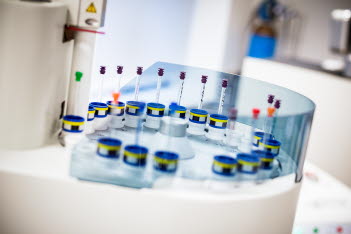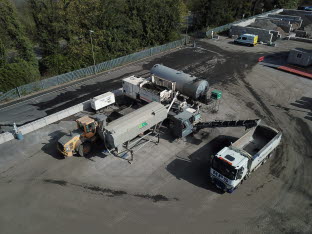-
Cold mix technology in the spotlight
New, advanced analysis methods to study the interaction between bitumen emulsions and mineral surfaces provide an important contribution to achieving sustainability benefits.
-
Rethinking road resurfacing
The three Rs of the circular economy – Reduce, Reuse and Recycle – could be used as the promoting mantra for UK based OCL Regeneration as they pave the way for more sustainable road resurfacing practices.
-
Safe, stable operations in Finland
Just a few miles from Turku in southern Finland, Nynas rents a number of bitumen tanks adjacent to the port of Naantali. A new multi-year agreement with the proprietor, Neste, ensures that Nynas will continue to have access to the depot's experienced staff and comprehensive services, ranging from operations to quality control and loading bays.
-
Sokndal, Norway
The recently opened Motorcenter Norway offers everything from go-carting to drag racing. Nynas was involved in the project by supplying Nypol HF 105, a polymer-modified bitumen ideal for pavements that are subjected to high stresses.
-
Talking point: Road infrastructure in North-Western Europe
Even though many successful road projects have been completed in Western Europe in recent years, the durability and availability of the road infrastructure needs to be improved.
-
30 years in Tallinn
For three decades, Nynas has contributed to an increased understanding of bitumen quality and supported the development of Estonian road infrastructure.
-
Knowledge saves lives
Regular training is the basis of all safety work. Only then is it possible to act both quickly and correctly if an accident actually occurs.
-
The way forward for Wales
Over ten years in the making, the Welsh Government’s new surface course specification centres around stone mastic asphalt (SMA) and hopes to significantly increase the service life of the road surface materials.
-
Landing surface fit for presidents
Teaming up around tightly scheduled works to upgrade the runway taxiways and apron at Cornwall Newquay Airport, Aggregate Industries and Nynas had to overcome challenging logistical issues. A close working partnership between them saw the project safely landed on time.
-
Paving the way for asphalt 4.0
Digitalisation is making inroads in the asphalt industry. The latest Eurasphalt & Eurobitume (E&E) Congress was held virtually in June. It was a success, but the next E&E event will allow industry stakeholders to meet face-to-face.
News









